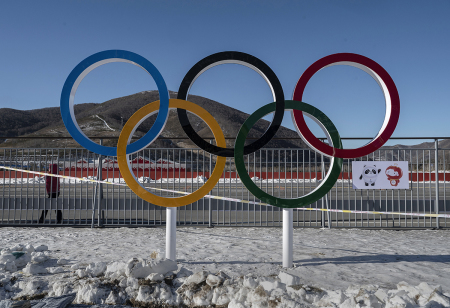Team USA advises Olympic athletes to leave phones at home to evade China's cyber spies

The United States and several other countries are advising Olympic athletes who'll be competing in the 2022 Winter Olympic and Paralympic Games in China to use disposable or “burner” phones and not their own devices due to the communist government’s possible surveillance.
“Every device, communication, transaction and online activity may be monitored,” reads a bulletin by the U.S. Olympic & Paralympic Committee, The Wall Street Journal reports.
“Your device(s) may also be compromised with malicious software, which could negatively impact future use,” the committee added.
The Canadian Olympic Committee has told its athletes to be “extra diligent at Games, including considering leaving personal devices at home, limiting personal information stored on devices brought to the Games, and to practice good cyber-hygiene at all times.”
The British Olympic Association and the Dutch Olympic Committee/Dutch Sports Federation have also advised the same to their athletes who are going to Beijing for the Games that are scheduled to begin Feb. 4.
In December, human rights organizations urged the Biden administration to send a statement to the Chinese government over its egregious human rights abuses by boycotting the Olympic Games.
U.S. State Department Spokesman Ned Price later announced that the agency “will not send any diplomatic or official representation to … the 2022 Winter Olympic and Paralympic Games in Beijing.”
Last year, the Trump administration officially designated China's persecution of Muslim minorities in western Xinjiang Province — including mass internment, forced labor and forced sterilization — as "genocide" and "crimes against humanity."
China has also been criticized for cracking down on unregistered house church movements as well as persecuting religious minorities like the Falun Gong, Tibetan Buddhists and others. China has been labeled for years by the U.S. State Department as a “country of particular concern” for egregious religious freedom violations.
Last July, the European Parliament voted overwhelmingly to call upon its member states to boycott the 2022 Beijing Olympic winter games due to human rights abuses.
The non-binding resolution called on EU members to “decline invitations for government representatives and diplomats to attend the Beijing 2022 Winter Olympics unless the Chinese Government demonstrates a verifiable improvement in the human rights situation in Hong Kong, the Xinjiang Uyghur Region, Tibet, Inner Mongolia and elsewhere in China.”
House Speaker Nancy Pelosi also called for a diplomatic boycott last May, saying: “For heads of state to go to China, in light of a genocide that is ongoing while you’re sitting there in your seats, really begs the question: What moral authority do you have to speak about human rights any place in the world if you’re willing to pay your respects to the Chinese government as they commit genocide?”
Some church leaders have also voiced concerns over China being the host for the Olympics.
The Rev. Patrick Mahoney, director of the Christian Defense Coalition, is a strong critic of the Communist Party and was banned from China after protesting the 2008 Summer Olympics in Tiananmen Square. Mahoney, a Reformed Presbyterian minister, has urged countries to boycott the 2022 games.
“How can we honor a country where Uyghurs are living in concentration and forced labor camps, Hong Kong democracy leaders are sitting in prison with no bail, Christian churches are bulldozed, political and religious dissidents are daily being brutalized and persecuted and so many more human rights atrocities [are occurring]?” he wrote.
He rallied people in front of NBC’s office last March to protest the broadcasting company’s coverage of what he called the “Beijing Genocide Games.”
Experts say the 2008 Olympics was a “soft power win” for China and that the 2022 Olympics has the potential to be the same.





















